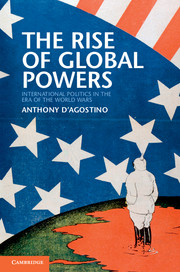Book contents
- Frontmatter
- Contents
- Maps
- Acknowledgements
- Introduction
- 1 The great powers at the dawn of world politics
- 2 Global origins of World War I: from the China scramble to the world crisis of 1904–1906
- 3 Global origins of World War I: a chain of revolutionary events across the world island
- 4 Balance and revolution, 1914–1918
- 5 A ragged peace, 1919
- 6 Scramble for Eurasia, 1919–1922
- 7 Drastic acts of unhappy powers, 1922–1923
- 8 Storms in the lull, 1924–1927
- 9 Politics and economics of the great slump, 1928–1933
- 10 A vogue for national economy
- 11 Mussolini’s moment, 1933–1935
- 12 The global civil war, 1936–1937
- 13 Last years of peace, 1937–1939
- 14 The European war, 1939–1941
- 15 The world war
- 16 Balance and hegemony
- Maps
- Notes
- Index
16 - Balance and hegemony
Published online by Cambridge University Press: 05 June 2012
- Frontmatter
- Contents
- Maps
- Acknowledgements
- Introduction
- 1 The great powers at the dawn of world politics
- 2 Global origins of World War I: from the China scramble to the world crisis of 1904–1906
- 3 Global origins of World War I: a chain of revolutionary events across the world island
- 4 Balance and revolution, 1914–1918
- 5 A ragged peace, 1919
- 6 Scramble for Eurasia, 1919–1922
- 7 Drastic acts of unhappy powers, 1922–1923
- 8 Storms in the lull, 1924–1927
- 9 Politics and economics of the great slump, 1928–1933
- 10 A vogue for national economy
- 11 Mussolini’s moment, 1933–1935
- 12 The global civil war, 1936–1937
- 13 Last years of peace, 1937–1939
- 14 The European war, 1939–1941
- 15 The world war
- 16 Balance and hegemony
- Maps
- Notes
- Index
Summary
G. K. Chesterton once remarked that there was nothing wrong with Americans but their ideals. Men of the world tend to fear good intentions almost as much as bad. A British Foreign Office strategic paper of 1946 worried that “the Americans are a mercurial people,” unduly swayed by sentiment and prejudice, laboring under “an archaic constitution.” Not the least of the worrisome traits of the Americans was the pretension to have discovered an alternative to the balance of power, secret alliances, and the rest of the sordid devices of the benighted Old World. In 1919 the American alternative was the New Diplomacy, the League of Nations, open covenants openly arrived at, self-determination for the oppressed nations. The Old World suspected that these were only a cover for the American national interest, in fact an interest in the entire world according to the Open Door. But the Old World went along, assuaged by the thought that it was sated with the triumphs of the nineteenth century and the Great War. It could live with its hard-won gains even under a new dispensation.
This would certainly not have been the case had the Great War been averted. The United States would not have been in such an influential position. The Modernizing Old Regimes, Germany, Austria-Hungary, Russia, and Japan would have had much more to say about the world order. Despite the fondest hopes of the European Social Democracy, it is exceedingly difficult to imagine any of these old regimes overthrown from within by revolution. Nor is it easy to envision their peaceful evolution into ceremonial monarchies run by democratically elected parliaments. An evolution like Japan’s would not have been excluded. Nor would some odd alignments among them. Their ruling classes would have been drawn from their confident and successful nobility, made all the more strident by the victories of imperial expansion. They would have been too much for the British to balance, even with the French and Americans as allies. Admiral Tirpitz’s idea of a “balance of power at sea” would have been the elusive ideal toward which all of peace-loving humanity would have striven. Failure to maintain the delicate equilibrium would no doubt have meant war, perhaps eventually war with nuclear weapons. The Wilsonian New Diplomacy that emerged after the Great War was a difficult rubric for the Old World to accept, but the alternatives might have been less pleasant.
- Type
- Chapter
- Information
- The Rise of Global PowersInternational Politics in the Era of the World Wars, pp. 467 - 494Publisher: Cambridge University PressPrint publication year: 2011

